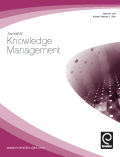 | |
| Discipline | Knowledge management |
|---|---|
| Language | English |
| Edited by | Manlio Del Giudice |
| Publication details | |
| History | 1997–present |
| Publisher | Emerald Insight |
| Frequency | 10/year |
| 8.689 (2021) | |
| Standard abbreviations | |
| ISO 4 | J. Knowl. Manag. |
| Indexing | |
| ISSN | 1367-3270 |
| LCCN | 99110965 |
| OCLC no. | 41891336 |
| Links | |
The Journal of Knowledge Management is a peer-reviewed academic journal covering knowledge management. [1] According to the Journal Citation Reports , the journal has a 2021 impact factor of 8.689. [2]